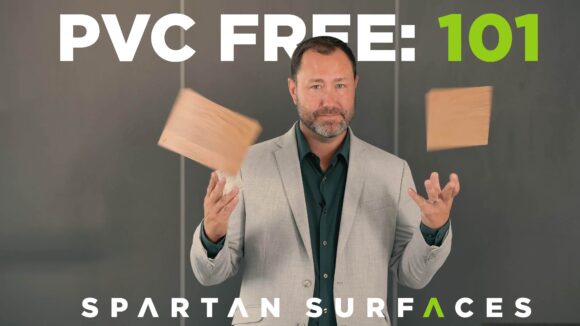Flooring University: PVC Free Flooring 101

What’s the difference between PVC and PVC free flooring? Everything and nothing. In a detailed video, Mike Blasek, Vice President of Sales for Spartan Services, shares his extensive 20-year experience in the flooring industry. He highlights his focus and passion for sustainability. This edition of Flooring University discusses the ins and outs of being PVC Free, providing a comprehensive guide.
What is PVC?
PVC, or polyvinyl chloride, is commonly in household items such as shower curtains, records, and vinyl flooring. You will also find it in car parts and PVC piping. Regarding flooring, PVC often contains plasticizers, making it flexible for easy installation. However, there are concerns regarding PVC’s sustainability and health impacts, leading to a growing interest in PVC-free options.
PVC Concerns
PVC, sometimes called the “big bad boogeyman,” has raised concerns due to the plasticizers used in its production. Often, phthalate-based plasticizers are bio-accumulative and have severe health impacts. They were initially regarded as endocrine disruptors, and their migration has various ramifications for individuals living and working in buildings with PVC flooring, especially those who are immune compromised.
What does PVC Free mean?
PVC-free refers to products not made of vinyl, such as wood, rubber, and other materials. In the flooring industry, PVC-free usually refers to a new technology of polyolefin or urethane-based products. These products do not contain phthalates, a significant benefit for those concerned about the health impacts of PVC.
Where is PVC Free Flooring Used?
PVC-free options are used in most applications where vinyl-based products are used, especially in areas with immune-compromised individuals such as chemo patients, NICUs, and cancer centers. These individuals are more sensitive to their environment, and removing potentially harmful materials is crucial for their health.
How is PVC-Free Flooring Made?
PVC free is made similarly to vinyl, typically consisting of a backing, a photo, and a wear layer. However, the materials used are different, often bio-based and more sustainable. One of the latest technologies in PVC free is a polyolefin base, made from a similar compound as a golf ball, making it easy to clean and highly durable.
How Does PVC Free Compare?
PVC-free flooring is dimensionally stable, super durable, and easy to clean. Although it may be more costly than vinyl due to the less common raw materials used, improved health and sustainability benefits often outweigh the cost. PVC-free products are also more environmentally friendly, reducing carbon footprint and improving indoor air quality.
Questions About PVC-Free Flooring
Common questions about PVC-free flooring include its stain resistance, durability, and track record. The answers are simple: PVC-free options are stain-resistant and durable and has proven longevity and clean-ability.
In conclusion, PVC-free is an excellent alternative to traditional vinyl, offering numerous benefits in terms of health, sustainability, and environmental impact. To learn more about PVC-free flooring, contact a Spartan representative, browse our website, or subscribe to the Spartan newsletter for more information.PVC-Free flooring 101!
About Spartan
Spartan Surfaces, a subsidiary of Floor & Decor, is a specialty flooring supplier headquartered in Bel Air, MD. Employing over 150 team members, Spartan holds warehousing and offices in Maryland and Minnesota with showrooms in D.C. and Chicago. Its geography encompasses seventy percent of the United States, with continued expansion on the horizon. Taking a human-centered approach, Spartan prides itself on great people dedicated to great products, great families, great friendships, and great happiness.
This article was updated on September 22nd, 2023. Originally published March 27th, 2023.